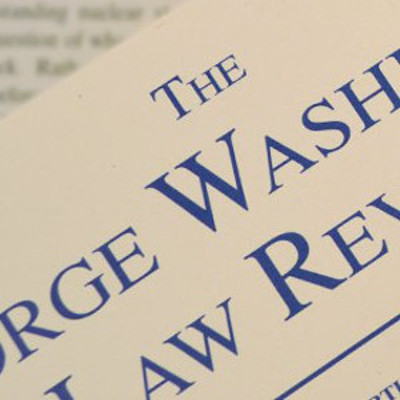Revisiting the Public Rights Doctrine: Justice Thomas’s Application of Originalism to Administrative Law
Laura Ferguson · 84 Geo. Wash. L. Rev. 1315 · Administrative agencies today adjudicate vastly more disputes than do Article III courts. The constitutional underpinnings of the administrative agency’s adjudicative power remain somewhat murky, however, as does today’s conception of which cases administrative agencies can appropriately adjudicate. The Supreme Court has said that Article III courts alone... Read More
The Future of Deference
Richard J. Pierce, Jr. · 84 Geo. Wash. L. Rev. 1293 · In this Essay, Professor Richard Pierce describes the history of the deference doctrines the Supreme Court has announced and applied to agency interpretations of ambiguous statutes and rules over the last seventy years. He predicts that the Court will continue to reduce the scope and... Read More
Preambles as Guidance
Kevin M. Stack · 84 Geo. Wash. L. Rev. 1252 · Debates over administrative agencies’ reliance on guidance documents have largely neglected the most authoritative source of guidance about the meaning of agency regulations: their preambles. This Article examines and defends the guidance function of preambles. Preambles were designed not only to provide the agency’s official justification... Read More
Chevron Bias
Philip Hamburger · 84 Geo. Wash. L. Rev. 1187 · This Article takes a fresh approach to Chevron deference. Chevron requires judges to defer to agency interpretations of statutes and justifies this on a theory of statutory authorization for agencies. This Article, however, points to a pair of constitutional questions about the role of judges—questions that have... Read More
Overseeing Agency Enforcement: A Foreword to the Annual Review of Administrative Law
Rachel E. Barkow · 84 Geo. Wash. L. Rev. 1129 · A big part of what agencies do—indeed, the core of their executive power—is law enforcement. Whether it is a statute or an agency regulation, agencies make sure that individuals and entities comply with the law. In the case of some agencies, such as prosecutors’ offices or police... Read More
A Risk-Based Approach to Limited Liability for Individuals and Corporate Parents
Dane P. Shikman 84 Geo. Wash. L. Rev. 1104 Corporate parents and individual shareholders are fundamentally different. In particular, they have different sensitivities to economic risks—yet the limited liability doctrine has failed to account for that difference. This Note argues the customary practice of mechanically applying a checklist of veil- piercing factors commonly favors corporate... Read More
Beyond Comparison: Practical Limitations of Implementing Comparative Juror Analysis in the Context of Sexual Orientation
Julia Haigney 84 Geo. Wash. L. Rev. 1075 Serving on a jury is an important civic duty. As such, the exclusion of potential jurors on the basis of their race, gender, or other discriminatory characteristics violates their rights under the Equal Protection Clause of the Fourteenth Amendment, according to Batson v. Kentucky and its progeny.... Read More
The Case for UDAAP-Based Credit Card Lending Regulations: Providing Greater Financial Security for America and American Consumers
Eric M. Aberg 84 Geo. Wash. L. Rev. 1029 In the lead up to the financial crisis of 2007–2009, federal banking regulators failed to keep large national banks in safe and sound condition while allowing them to engage in lending practices that exploited vulnerable consumers. Measures have been passed in recent years to reign in... Read More
Lenient in Theory, Dumb in Fact: Prison, Speech, and Scrutiny
David M. Shapiro 84 Geo. Wash. L. Rev. 972 The Supreme Court declared thirty years ago in Turner v. Safley that prisoners are not without constitutional rights: any restriction on those rights must be justified by a reasonable relationship between the restriction at issue and a legitimate penological objective. In practice, however, the decision has... Read More
Plea Bargaining and Price Theory
Russell D. Covey 84 Geo. Wash. L. Rev. 920 Like other markets, the plea bargaining market uses a pricing mechanism to coordinate market functions and to communicate critical information to participants, information that permits rational decisionmaking in the face of uncertainty. Because plea bargaining plays such a prominent role in the administration of criminal justice,... Read More

